2024届人教版高考英语一轮复习语法专题8定语从句课件(共48张PPT)
文档属性
| 名称 | 2024届人教版高考英语一轮复习语法专题8定语从句课件(共48张PPT) | 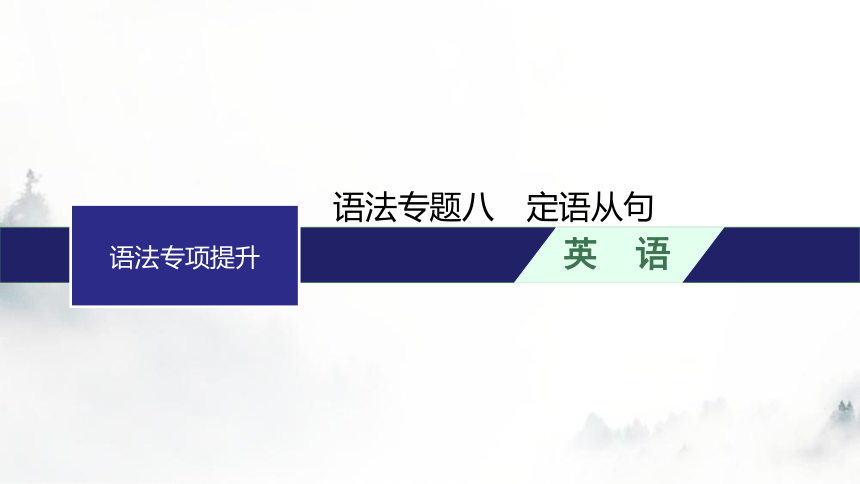 | |
| 格式 | ppt | ||
| 文件大小 | 826.5KB | ||
| 资源类型 | 教案 | ||
| 版本资源 | 人教版(2019) | ||
| 科目 | 英语 | ||
| 更新时间 | 2024-02-04 11:00:20 | ||
图片预览



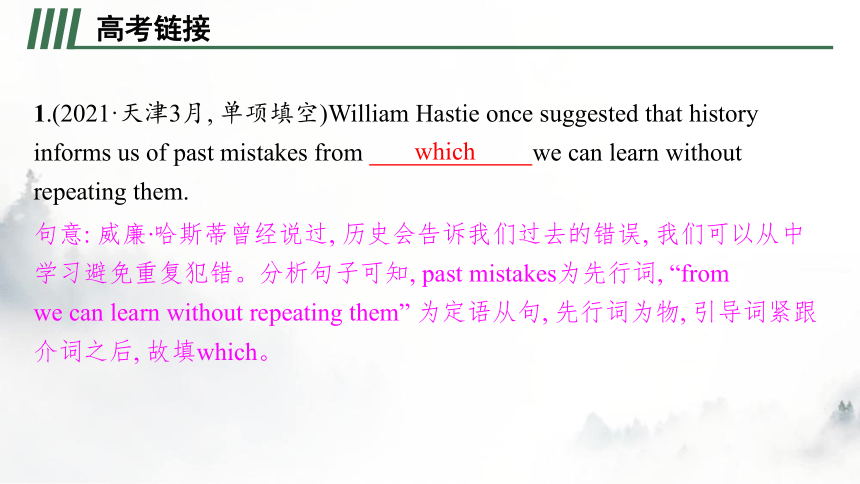
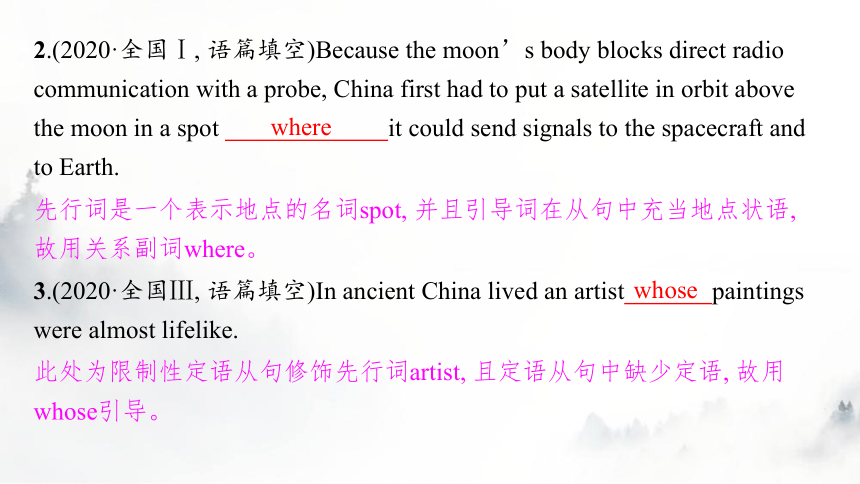
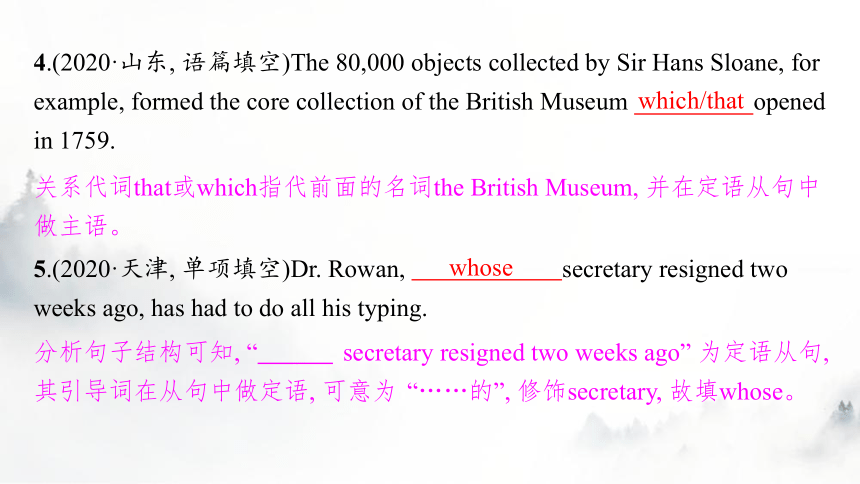
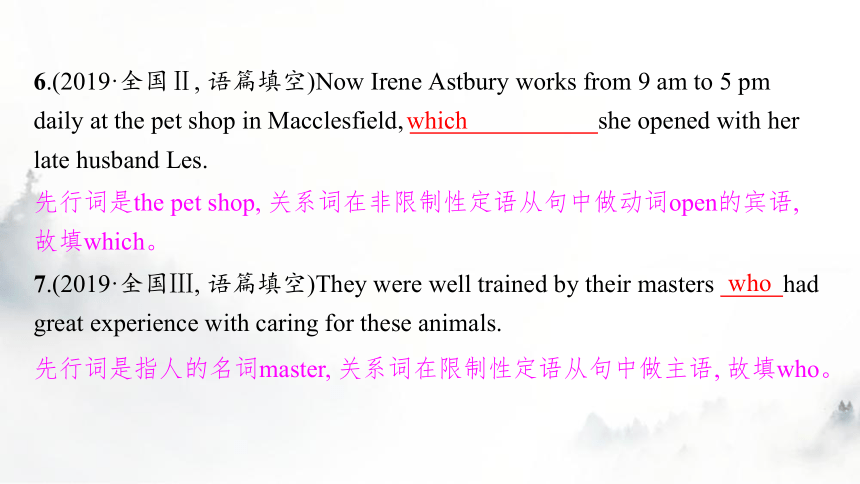
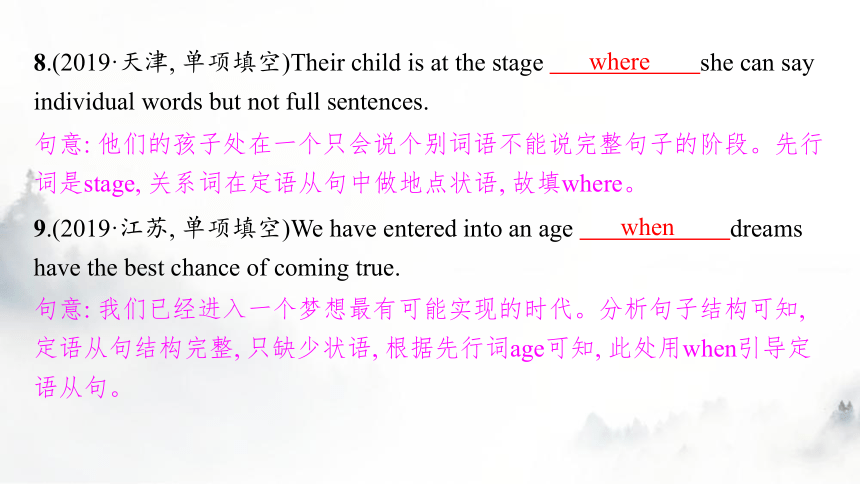
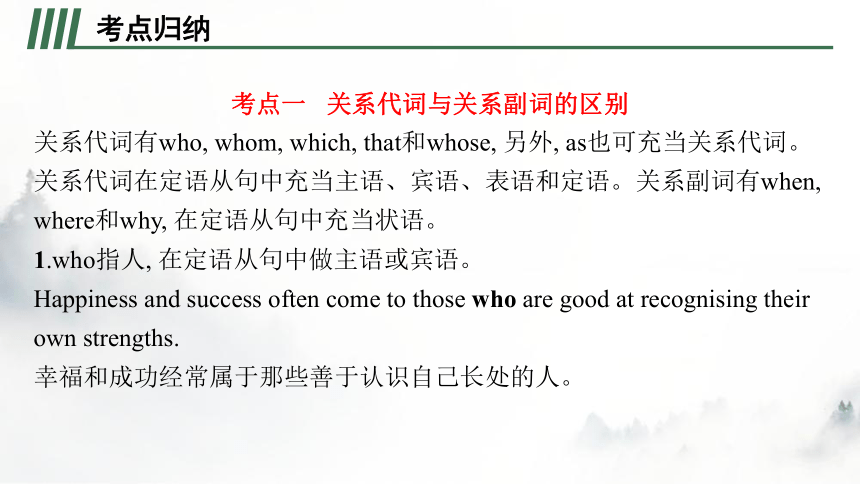
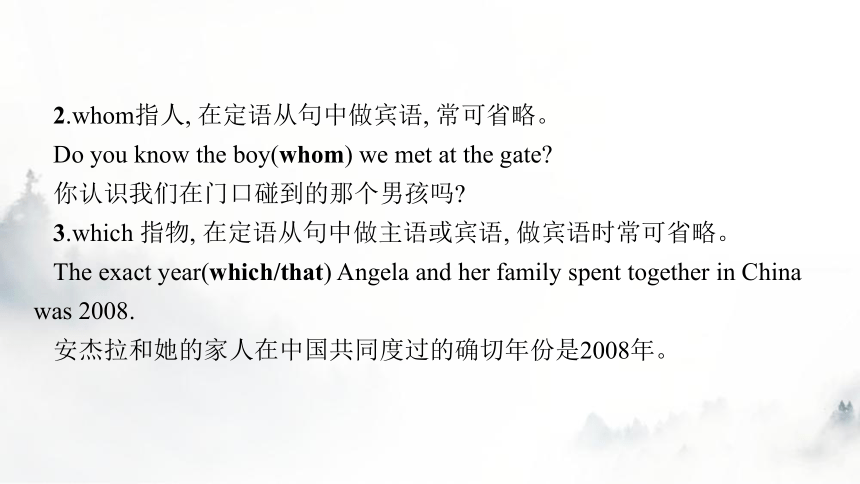
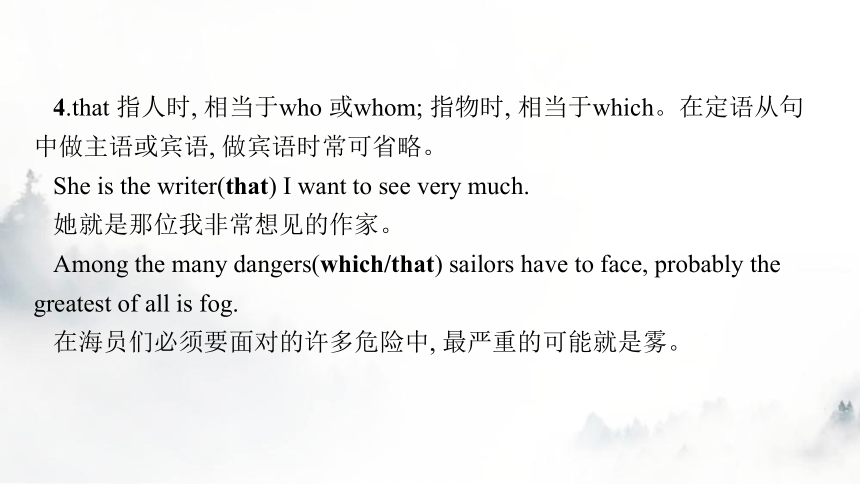
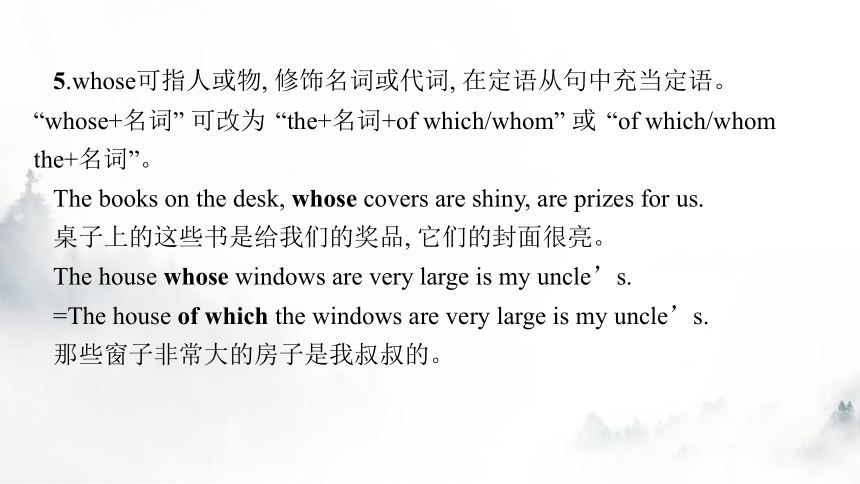
文档简介
(共48张PPT)
语法专项提升
语法专题八 定语从句
英 语
内容索引
核心考点 分层突破
专项训练 巩固提升
核心考点 分层突破
高考链接
1.(2021·天津3月, 单项填空)William Hastie once suggested that history informs us of past mistakes from we can learn without repeating them.
which
句意: 威廉·哈斯蒂曾经说过, 历史会告诉我们过去的错误, 我们可以从中学习避免重复犯错。分析句子可知, past mistakes为先行词, “from we can learn without repeating them” 为定语从句, 先行词为物, 引导词紧跟介词之后, 故填which。
2.(2020·全国Ⅰ, 语篇填空)Because the moon’s body blocks direct radio communication with a probe, China first had to put a satellite in orbit above the moon in a spot it could send signals to the spacecraft and to Earth.
3.(2020·全国Ⅲ, 语篇填空)In ancient China lived an artist paintings were almost lifelike.
where
先行词是一个表示地点的名词spot, 并且引导词在从句中充当地点状语, 故用关系副词where。
whose
此处为限制性定语从句修饰先行词artist, 且定语从句中缺少定语, 故用whose引导。
4.(2020·山东, 语篇填空)The 80,000 objects collected by Sir Hans Sloane, for example, formed the core collection of the British Museum opened in 1759.
5.(2020·天津, 单项填空)Dr. Rowan, secretary resigned two weeks ago, has had to do all his typing.
which/that
关系代词that或which指代前面的名词the British Museum, 并在定语从句中做主语。
whose
分析句子结构可知, “ secretary resigned two weeks ago” 为定语从句, 其引导词在从句中做定语, 可意为 “……的”, 修饰secretary, 故填whose。
6.(2019·全国Ⅱ, 语篇填空)Now Irene Astbury works from 9 am to 5 pm daily at the pet shop in Macclesfield, she opened with her late husband Les.
7.(2019·全国Ⅲ, 语篇填空)They were well trained by their masters had great experience with caring for these animals.
which
先行词是the pet shop, 关系词在非限制性定语从句中做动词open的宾语, 故填which。
who
先行词是指人的名词master, 关系词在限制性定语从句中做主语, 故填who。
8.(2019·天津, 单项填空)Their child is at the stage she can say individual words but not full sentences.
9.(2019·江苏, 单项填空)We have entered into an age dreams have the best chance of coming true.
where
句意: 他们的孩子处在一个只会说个别词语不能说完整句子的阶段。先行词是stage, 关系词在定语从句中做地点状语, 故填where。
when
句意: 我们已经进入一个梦想最有可能实现的时代。分析句子结构可知, 定语从句结构完整, 只缺少状语, 根据先行词age可知, 此处用when引导定语从句。
考点归纳
考点一 关系代词与关系副词的区别
关系代词有who, whom, which, that和whose, 另外, as也可充当关系代词。关系代词在定语从句中充当主语、宾语、表语和定语。关系副词有when, where和why, 在定语从句中充当状语。
1.who指人, 在定语从句中做主语或宾语。
Happiness and success often come to those who are good at recognising their own strengths.
幸福和成功经常属于那些善于认识自己长处的人。
2.whom指人, 在定语从句中做宾语, 常可省略。
Do you know the boy(whom) we met at the gate
你认识我们在门口碰到的那个男孩吗
3.which 指物, 在定语从句中做主语或宾语, 做宾语时常可省略。
The exact year(which/that) Angela and her family spent together in China was 2008.
安杰拉和她的家人在中国共同度过的确切年份是2008年。
4.that 指人时, 相当于who 或whom; 指物时, 相当于which。在定语从句中做主语或宾语, 做宾语时常可省略。
She is the writer(that) I want to see very much.
她就是那位我非常想见的作家。
Among the many dangers(which/that) sailors have to face, probably the greatest of all is fog.
在海员们必须要面对的许多危险中, 最严重的可能就是雾。
5.whose可指人或物, 修饰名词或代词, 在定语从句中充当定语。“whose+名词” 可改为 “the+名词+of which/whom” 或 “of which/whom the+名词”。
The books on the desk, whose covers are shiny, are prizes for us.
桌子上的这些书是给我们的奖品, 它们的封面很亮。
The house whose windows are very large is my uncle’s.
=The house of which the windows are very large is my uncle’s.
那些窗子非常大的房子是我叔叔的。
6.as既可指人也可指物, 在定语从句中做主语、宾语或表语。
(1)引导限制性定语从句, 先行词前常有as, the same, so, such修饰, 且在从句中做主语、宾语或表语时, 关系代词要用as。
It was so difficult a problem as nobody in my class could work out. (as做work out的宾语)
这个问题很难以至于我们班里没有人能解出来。
注意so/such...that结构中, that引导结果状语从句, 只起连接作用, 不充当从句的任何成分。
It was so difficult a problem that nobody in my class could work it out. (work out 已经有宾语, that只起连接作用)
(2)as可以引导非限制性定语从句, 代指整个主句的内容, 从句中常用的谓语动词为see, say, hear, expect, know, report等, 常意为 “正如; 正像”, 其引导的从句可以放在主句前面也可以放在主句后面。
The number of smokers, as is reported, has dropped by 17 percent in just one year.
正如所报道的, 吸烟者的数量在仅仅一年中下降了17%。
7.when指时间, 在定语从句中做时间状语。其先行词是表示时间的名词time, day, week, year, month等, 常用on which, in which, at which, during which等代替。
As the smallest child of his family, Alex is always longing for the time when he should be able to be independent.
作为家中最小的孩子, 亚历克斯总是渴望自己能够独立的日子。
I am looking forward to the day when/on which my daughter can read this book and know my feelings for her.
我一直期盼那一天, 我的女儿能够读懂这本书并且知道我对她的情感。
8.where 指地点, 在定语从句中做地点状语。其先行词是表示地点的名词, 可以用“介词+关系代词”代替。
The house where/in which he lives is near the river.
他住的房子在河边。
注意高考对where的考查趋于复杂, 先行词由 “明显的地点” 转为 “模糊的地点”, 或者说“抽象的地点”。这些名词有stage, case, position, situation, point, occasion, activity 等。
Students should involve themselves in community activities where/in which they can gain experience for growth.
学生应该参与社区活动, 在这些活动中他们能获取成长的经验。
9.why 指原因, 在定语从句中做原因状语, 可用for which来替代。why不可引导非限制性定语从句。
Tell me the reason why/for which you came late.
告诉我你来晚了的原因。
注意用关系代词还是关系副词完全取决于从句中的谓语动词。及物动词后面无宾语, 就必须要用关系代词; 而不及物动词则要求用关系副词。
考点二 必须用关系代词that的情况
1.当先行词是everything, anything, nothing, something, all, none, few, little, some等不定代词时, 或当先行词被every, any, all, some, no, little, few, much等不定代词修饰时。
We should do all that is useful to the people.
我们应该做一切有益于人民的事情。
2.先行词被the only, the very, the same, the last等修饰时。
This is the last place that I want to visit.
这是我最不想参观的地方。
3.先行词是最高级或被最高级修饰时。
This is the best novel that I have ever read.
这是我读过的最好的一部小说。
4.先行词是数词或被序数词修饰时。
This is the third dictionary that I have used.
这是我用过的第三本字典。
5.当先行词同时含有表示人和物的名词时。
We talked about the things and persons that we were interested in.
我们谈论了我们感兴趣的人和事。
6.以who或which开头的特殊疑问句中含有定语从句, 为避免重复时。
Who is the man that is standing under the tree 站在树下的那个人是谁
考点三 不能用关系代词that的情况
1.在 “介词+关系代词” 的结构中, 关系代词只能用指物的which和指人的whom。
This is the train by which we went to Beijing.
这就是我们去北京乘的那列火车。
2.在非限制性定语从句(即通常用逗号与主句隔开, 若去掉整个句子仍能表达完整意义的定语从句)中。
I borrowed the book Sherlock Holmes from the library last week, which my classmates recommended to me.
上周我从图书馆里借了《夏洛克·福尔摩斯》这本书, 书是我的同学向我推荐的。
3.指人时, 当先行词为everybody, anybody, everyone, anyone等时, 关系代词要用who, 不用that。
Is there anyone who can answer this question
有谁能回答这个问题
4.先行词本身是指示代词that或those时, 关系代词应用which。
What’s that which she is looking at
她正在看什么
考点四 as与which引导非限制性定语从句的区别
1.位置不同。which 引导的定语从句只置于所限制的句子后; as引导的定语从句位置较灵活, 也就是说as从句可置于所限制的句子前、插在句子中或放在句子后。
It is a truly delightful place, which looks the same as it must have been 100 years ago with its winding streets and pretty cottages.
它确实是一个宜人的地方。与一百年前的样子一样, 有着弯弯曲曲的小径和漂亮的村舍。
Mike, as you know, is an honest man./Mike is an honest man, as you know./As you know, Mike is an honest man.
如你所知, 迈克是个诚实的人。
2.先行词不同。as引导非限制性定语从句时, 其先行词多为一个句子; which引导非限制性定语从句时, 其先行词可以是一个词、一个短语或一个句子。
As we all know, he is very proud. (先行词为一个句子)
众所周知, 他很傲慢。
The train, which is usually punctual. (先行词是一个词)
这趟火车通常都很准时。
3.意义不同。as一般意为 “正如; 就像” ; which一般意为 “这一点; 这件事”。
John, as you know, is my best friend.
正如你所知, 约翰是我最好的朋友。
He has been to Paris more than ten times, which I don’t believe.
他已去过巴黎十多次了, 这一点我不相信。
4.关系不同。当主句和从句之间存在着逻辑上的因果关系时, 关系词往往只用which。
Tom was late for school, which made his teacher very angry.
汤姆上学迟到了, 这使他老师很生气。
注意as多用于下列习惯用语中:
①as everyone can see正如所有人所看到的那样
②as we had expected正如我们所预料的那样
③as often happens正如经常发生的那样
④as has been said before如之前所述
⑤as is mentioned above正如上面所提到的
考点五 “介词+关系代词”引导的定语从句
1.在 “介词+关系代词” 结构中, 关系代词指人时用whom, 不可用who或者that; 指物时用which, 不能用that; 关系代词是所有格时用whose。
The person to whom you’ll write is Mr Ball.
你将给他写信的那个人是鲍尔先生。
I wish to thank Professor Smith, without whose help I would never have achieved what I am today.
我想要感谢史密斯教授, 没有他的帮助我不会取得今天的成就。
2.“介词+关系代词” 前可有some, any, none, both, all, neither, most, each, few等代词及名词、数词。
Her sons, both of whom work abroad, ring her up every week.
她的两个儿子都在国外工作, 每周都给她打电话。
I live in a house, the window of which faces south.
我住在一个房子里, 这个房子的窗户朝南。
3.“介词+关系代词” 结构中介词的选择可根据定语从句中谓语动词和介词的习惯搭配、先行词和介词的习惯搭配来确定, 有时也需要结合句意。
In the street there wasn’t any person to whom she could turn for help.
在这条街上, 她找不到任何人帮忙。
The boss in whose company my father works is a very kind person.
我父亲工作的公司, 老板是个非常善良的人。
4.“复合介词短语+关系代词which” 引导的定语从句中, 定语从句常和先行词用逗号分开, 定语从句常用倒装语序。
He lives in a big house, in front of which stands an apple tree.
他住在一所大房子里, 前面有一棵苹果树。
注意在一些固定搭配的短语动词中, 由于动词和介词不能分割, 因此不能把介词置于关系代词之前。
This is the book (which/that) I’m looking for.
这是我正在找的那本书。
不可以说: This is the book for which I’m looking.
5.from where 虽为“介词+关系副词”结构, 但也可引导定语从句, where往往指代前面表示具体位置的介词短语。
He stood on top of the hill, from where he could see the whole village. (where指代on top of the hill, 指的是“从山顶那个地方看”, 而不是指“山”)
他站在山顶, 从那里他可以看到整个村庄。
考点六 定语从句与其他句型的区别
1.定语从句与同位语从句的区别。二者都跟在名词后面, 区别: 定语从句修饰先行词, 是对其进行修饰限定; 同位语从句则是对前面名词的解释说明, 是其内容。同位语从句前的名词常为抽象名词, 如idea, fact, truth, evidence, news, thought。同位语从句主要由that引导, 在从句中不做成分, 有时也可以由when, where, how, why, whether, what等词引导, 在从句中充当成分。
The news that our team won made us excited. (our team won是news的内容, that不充当从句的成分, 为同位语从句。可理解为: The news was that our team won.)
我们队赢了的消息让我们很兴奋。
The news that he told me was exciting. (he told me 缺少一个直接宾语, 由that充当, 故为定语从句。不能将其理解为: The news was that he told me.)
他告诉我的消息令人兴奋。
2.定语从句与并列句和简单句的区别。区别的关键是看标点和连接词。
Our class has sixty students, most of whom study hard. (逗号后为另一个句子, 两个句子之间要用关系代词whom, 为定语从句)
我们班有六十名学生, 大多数学习很刻苦。
Our class has sixty students, and most of them study hard. (逗号后为另一个句子, 且已经有并列连词and, 故用them即可, 为并列句)
Our class has sixty students. Most of them study hard. (两句之间为句号, 代表两个独立的简单句, 故不需要连接词)
3.定语从句与状语从句的区别。定语从句的前面必有先行词, 而状语从句(如时间状语从句和地点状语从句)则是做整个句子的状语, 前面没有先行词。
Do you know the time when he will come back (定语从句, 前面有先行词the time)
你知道他什么时候回来吗
I will go shopping when he comes back. (时间状语从句, 表示主句动作发生的时间, 前面没有先行词)
当他回来的时候, 我将去购物。
Put the book where it belongs. (地点状语从句, 指的是“放书”的地点, 前面无先行词, 因此不能用to which)
把书放在它该放的地方。
Put the book in the place where it belongs. (定语从句, 前面有先行词place)
4.定语从句与强调句的区别。当it is/was后出现表示地点或时间的名词时, 其后所接的从句是定语从句还是强调句, 要看将it is/was和that(可以先假设)去掉之后句式是否完整(不缺少成分), 若句式完整则为强调句。
It was Sunday when he came back. (定语从句)
他星期天回来的。
It was on Sunday that he came back. (强调句式, 强调的是时间状语on Sunday, 去掉It was和that后句式完整)
他是星期天回来的。
考点七 几种特殊情况
1.当先行词为way, 意为“方法; 方式”, 且在定语从句中做主语或宾语时, 可用关系代词which或that; 做状语时, 要用in which 或that或不填任何关系词。
The way(that/in which) he finished the task successfully was difficult to understand. (做状语)
他成功完成任务的方式很难理解。
The way (that/which) he explained to me was not difficult to understand. (做宾语)
他向我解释的方式并不难理解。
2.当先行词为time时, 若表示“一段时间”, 后面定语从句用when引导, 也可用at/during which; 若表示“次数”, 后面定语从句用that引导, that可以省略。
There was a time when we had no TV sets.
有段时间我们没有电视机。
This is the second time(that) the president has visited our country.
这是这位总统第二次访问我们国家。
专项训练 巩固提升
Ⅰ.单句语法填空
1.(2021·广西玉林高三月考)Figuring out what makes you happy can be a long process, as you will find the same things make you happy don’t necessarily make everyone else happy.
as
“the same +名词”中, 名词后面的定语用关系代词as引导表示前后指的是同一件事, as在从句中做主语。
2.(2020·北京海淀高三二模)Walking together, we had a lot of conversations through I learned many valuable lessons.
which
“through I learned many valuable lessons” 为定语从句修饰先行词conversations, 引导词在介词through后面, 故填which。
3.(2020·北京朝阳高三二模)A man called Andy set out for the Pacific Crest Trail, stretches from the borders of Mexico to Canada.
which
该从句为非限制性定语从句, 并且引导词在从句中做主语, 故填which。
4.Some people think that the great Chinese scholar Confucius, lived from roughly 551 BCE to 479 BCE, influenced the development of chopsticks.
who
根据对逗号前后内容的分析可以看出空格处所在句子为非限制性定语从句, 其先行词Confucius 指人, 故用who引导该定语从句并做从句的主语。
5.Maybe you have a habit is driving your family crazy.
that/which
句意: 也许你有一个能使你的家人发疯的习惯。这里habit是先行词, which或that引导的是定语从句, 并且在从句中做主语, 不能省略, 故填that或which。
6.(2019·广东六校联盟联考)Being afraid of expressing myself was one of the reasons I rarely did well in school.
why
先行词为表示原因的名词reasons, 并且引导词在从句中做状语, 故填why。
7.(2019·河南中原名校质量考评)We agreed that it would be decided by my dad, didn’t return home from work.
who
who引导非限制性定语从句, 并在从句中做主语, 代替先行词my dad。
8.(2019·辽宁葫芦岛协作校联考)My father, a scientist, works to save rare birds, some of are really clever and can even say some words.
9.(2019·河南信阳模拟)I actually kept the light on in my bed room the whole night, finally put me at ease.
which
which引导非限制性定语从句, 做介词of的宾语, 代替先行词birds。
which
which引导非限制性定语从句, 并代替整个主句内容。
10.It sits in the northern Pacific and is a place it’s neither too hot nor too cold.
where
先行词是地点名词 place, 引导词在从句中做状语, 故填where。
11.Recently, I thought about the benefits reading could bring us.
that/which
that或which引导定语从句, 在从句中做宾语, 该从句修饰the benefits。
12. someone once said,“Art is life.”
13.He is a famous architect designs won an international award last year.
As
as引导非限制性定语从句, 意为“正如某人说过的”, 故填As。
whose
分析句子结构可知, 这是一个含有定语从句的复合句, 定语从句的引导词在从句中做定语, 修饰designs, 意为 “……的”, 故填whose。
14.This is Mary, is taking over my job when I leave.
who
先行词是Mary, 指人, 从句中缺少主语, 故填who。
15.Summer is the time people enjoy warm weather.
when
分析句子结构可知, 空处引导定语从句, 先行词为the time, 关系词在定语从句中做时间状语, 故填when。
16.I’m looking at the photograph you sent me with your letter.
17.He paid the boy $10 for washing ten windows, most of hadn’t been cleaned for at least a year.
that/which
先行词是物photograph, 且在从句中做宾语, 故填that或which。
of which
which的先行词是windows, windows在从句中做介词of的宾语, 介词后面不能用关系代词that, 故填which。
18.Scientists have searched for a long time for a reason so many bees are disappearing.
why/for which
分析句子结构可知空格后为定语从句。先行词是reason, 关系词在定语从句so many bees are disappearing中做状语, 故用why或for which来引导。
Ⅱ.完成句子
1. (正如我们预料的), he performed the task with success.
2.This is the best film (在过去的几年里我曾经看过的).
3.The result must have been disappointing,____________________________
(这可以从他脸上失望的表情看出来).
4.You’d better ask your teachers and parents for advice,_________________
(通过这种方式你将会做出理智的决定).
5.This is the reason (他为什么要离开得如此匆忙).
As we expected
that I have ever seen in the past few years
which can be seen from the
disappointed look on his face
by which means
you will make a wise decision
why/for which he is leaving in such a hurry
6.Mr Brown moved to a place (位于海边), so he could go swimming every day.
7.I have got into a difficult situation__________________________________
(我必须全靠自己做出迅速的决定).
8.It’s the same person (我们一直在寻找的) in the past few days.
9.Anyone (想展示个人才艺的) can go in for the programme.
10.Learning strategies,_____________________________________________
(老师们一直非常重视的) have not drawn enough attention of students.
which/that lies near the sea
where/in which I must make a quick
decision all by myself
that we have been looking for
who wants to show the personal talent
to which teachers have been attaching great importance
语法专项提升
语法专题八 定语从句
英 语
内容索引
核心考点 分层突破
专项训练 巩固提升
核心考点 分层突破
高考链接
1.(2021·天津3月, 单项填空)William Hastie once suggested that history informs us of past mistakes from we can learn without repeating them.
which
句意: 威廉·哈斯蒂曾经说过, 历史会告诉我们过去的错误, 我们可以从中学习避免重复犯错。分析句子可知, past mistakes为先行词, “from we can learn without repeating them” 为定语从句, 先行词为物, 引导词紧跟介词之后, 故填which。
2.(2020·全国Ⅰ, 语篇填空)Because the moon’s body blocks direct radio communication with a probe, China first had to put a satellite in orbit above the moon in a spot it could send signals to the spacecraft and to Earth.
3.(2020·全国Ⅲ, 语篇填空)In ancient China lived an artist paintings were almost lifelike.
where
先行词是一个表示地点的名词spot, 并且引导词在从句中充当地点状语, 故用关系副词where。
whose
此处为限制性定语从句修饰先行词artist, 且定语从句中缺少定语, 故用whose引导。
4.(2020·山东, 语篇填空)The 80,000 objects collected by Sir Hans Sloane, for example, formed the core collection of the British Museum opened in 1759.
5.(2020·天津, 单项填空)Dr. Rowan, secretary resigned two weeks ago, has had to do all his typing.
which/that
关系代词that或which指代前面的名词the British Museum, 并在定语从句中做主语。
whose
分析句子结构可知, “ secretary resigned two weeks ago” 为定语从句, 其引导词在从句中做定语, 可意为 “……的”, 修饰secretary, 故填whose。
6.(2019·全国Ⅱ, 语篇填空)Now Irene Astbury works from 9 am to 5 pm daily at the pet shop in Macclesfield, she opened with her late husband Les.
7.(2019·全国Ⅲ, 语篇填空)They were well trained by their masters had great experience with caring for these animals.
which
先行词是the pet shop, 关系词在非限制性定语从句中做动词open的宾语, 故填which。
who
先行词是指人的名词master, 关系词在限制性定语从句中做主语, 故填who。
8.(2019·天津, 单项填空)Their child is at the stage she can say individual words but not full sentences.
9.(2019·江苏, 单项填空)We have entered into an age dreams have the best chance of coming true.
where
句意: 他们的孩子处在一个只会说个别词语不能说完整句子的阶段。先行词是stage, 关系词在定语从句中做地点状语, 故填where。
when
句意: 我们已经进入一个梦想最有可能实现的时代。分析句子结构可知, 定语从句结构完整, 只缺少状语, 根据先行词age可知, 此处用when引导定语从句。
考点归纳
考点一 关系代词与关系副词的区别
关系代词有who, whom, which, that和whose, 另外, as也可充当关系代词。关系代词在定语从句中充当主语、宾语、表语和定语。关系副词有when, where和why, 在定语从句中充当状语。
1.who指人, 在定语从句中做主语或宾语。
Happiness and success often come to those who are good at recognising their own strengths.
幸福和成功经常属于那些善于认识自己长处的人。
2.whom指人, 在定语从句中做宾语, 常可省略。
Do you know the boy(whom) we met at the gate
你认识我们在门口碰到的那个男孩吗
3.which 指物, 在定语从句中做主语或宾语, 做宾语时常可省略。
The exact year(which/that) Angela and her family spent together in China was 2008.
安杰拉和她的家人在中国共同度过的确切年份是2008年。
4.that 指人时, 相当于who 或whom; 指物时, 相当于which。在定语从句中做主语或宾语, 做宾语时常可省略。
She is the writer(that) I want to see very much.
她就是那位我非常想见的作家。
Among the many dangers(which/that) sailors have to face, probably the greatest of all is fog.
在海员们必须要面对的许多危险中, 最严重的可能就是雾。
5.whose可指人或物, 修饰名词或代词, 在定语从句中充当定语。“whose+名词” 可改为 “the+名词+of which/whom” 或 “of which/whom the+名词”。
The books on the desk, whose covers are shiny, are prizes for us.
桌子上的这些书是给我们的奖品, 它们的封面很亮。
The house whose windows are very large is my uncle’s.
=The house of which the windows are very large is my uncle’s.
那些窗子非常大的房子是我叔叔的。
6.as既可指人也可指物, 在定语从句中做主语、宾语或表语。
(1)引导限制性定语从句, 先行词前常有as, the same, so, such修饰, 且在从句中做主语、宾语或表语时, 关系代词要用as。
It was so difficult a problem as nobody in my class could work out. (as做work out的宾语)
这个问题很难以至于我们班里没有人能解出来。
注意so/such...that结构中, that引导结果状语从句, 只起连接作用, 不充当从句的任何成分。
It was so difficult a problem that nobody in my class could work it out. (work out 已经有宾语, that只起连接作用)
(2)as可以引导非限制性定语从句, 代指整个主句的内容, 从句中常用的谓语动词为see, say, hear, expect, know, report等, 常意为 “正如; 正像”, 其引导的从句可以放在主句前面也可以放在主句后面。
The number of smokers, as is reported, has dropped by 17 percent in just one year.
正如所报道的, 吸烟者的数量在仅仅一年中下降了17%。
7.when指时间, 在定语从句中做时间状语。其先行词是表示时间的名词time, day, week, year, month等, 常用on which, in which, at which, during which等代替。
As the smallest child of his family, Alex is always longing for the time when he should be able to be independent.
作为家中最小的孩子, 亚历克斯总是渴望自己能够独立的日子。
I am looking forward to the day when/on which my daughter can read this book and know my feelings for her.
我一直期盼那一天, 我的女儿能够读懂这本书并且知道我对她的情感。
8.where 指地点, 在定语从句中做地点状语。其先行词是表示地点的名词, 可以用“介词+关系代词”代替。
The house where/in which he lives is near the river.
他住的房子在河边。
注意高考对where的考查趋于复杂, 先行词由 “明显的地点” 转为 “模糊的地点”, 或者说“抽象的地点”。这些名词有stage, case, position, situation, point, occasion, activity 等。
Students should involve themselves in community activities where/in which they can gain experience for growth.
学生应该参与社区活动, 在这些活动中他们能获取成长的经验。
9.why 指原因, 在定语从句中做原因状语, 可用for which来替代。why不可引导非限制性定语从句。
Tell me the reason why/for which you came late.
告诉我你来晚了的原因。
注意用关系代词还是关系副词完全取决于从句中的谓语动词。及物动词后面无宾语, 就必须要用关系代词; 而不及物动词则要求用关系副词。
考点二 必须用关系代词that的情况
1.当先行词是everything, anything, nothing, something, all, none, few, little, some等不定代词时, 或当先行词被every, any, all, some, no, little, few, much等不定代词修饰时。
We should do all that is useful to the people.
我们应该做一切有益于人民的事情。
2.先行词被the only, the very, the same, the last等修饰时。
This is the last place that I want to visit.
这是我最不想参观的地方。
3.先行词是最高级或被最高级修饰时。
This is the best novel that I have ever read.
这是我读过的最好的一部小说。
4.先行词是数词或被序数词修饰时。
This is the third dictionary that I have used.
这是我用过的第三本字典。
5.当先行词同时含有表示人和物的名词时。
We talked about the things and persons that we were interested in.
我们谈论了我们感兴趣的人和事。
6.以who或which开头的特殊疑问句中含有定语从句, 为避免重复时。
Who is the man that is standing under the tree 站在树下的那个人是谁
考点三 不能用关系代词that的情况
1.在 “介词+关系代词” 的结构中, 关系代词只能用指物的which和指人的whom。
This is the train by which we went to Beijing.
这就是我们去北京乘的那列火车。
2.在非限制性定语从句(即通常用逗号与主句隔开, 若去掉整个句子仍能表达完整意义的定语从句)中。
I borrowed the book Sherlock Holmes from the library last week, which my classmates recommended to me.
上周我从图书馆里借了《夏洛克·福尔摩斯》这本书, 书是我的同学向我推荐的。
3.指人时, 当先行词为everybody, anybody, everyone, anyone等时, 关系代词要用who, 不用that。
Is there anyone who can answer this question
有谁能回答这个问题
4.先行词本身是指示代词that或those时, 关系代词应用which。
What’s that which she is looking at
她正在看什么
考点四 as与which引导非限制性定语从句的区别
1.位置不同。which 引导的定语从句只置于所限制的句子后; as引导的定语从句位置较灵活, 也就是说as从句可置于所限制的句子前、插在句子中或放在句子后。
It is a truly delightful place, which looks the same as it must have been 100 years ago with its winding streets and pretty cottages.
它确实是一个宜人的地方。与一百年前的样子一样, 有着弯弯曲曲的小径和漂亮的村舍。
Mike, as you know, is an honest man./Mike is an honest man, as you know./As you know, Mike is an honest man.
如你所知, 迈克是个诚实的人。
2.先行词不同。as引导非限制性定语从句时, 其先行词多为一个句子; which引导非限制性定语从句时, 其先行词可以是一个词、一个短语或一个句子。
As we all know, he is very proud. (先行词为一个句子)
众所周知, 他很傲慢。
The train, which is usually punctual. (先行词是一个词)
这趟火车通常都很准时。
3.意义不同。as一般意为 “正如; 就像” ; which一般意为 “这一点; 这件事”。
John, as you know, is my best friend.
正如你所知, 约翰是我最好的朋友。
He has been to Paris more than ten times, which I don’t believe.
他已去过巴黎十多次了, 这一点我不相信。
4.关系不同。当主句和从句之间存在着逻辑上的因果关系时, 关系词往往只用which。
Tom was late for school, which made his teacher very angry.
汤姆上学迟到了, 这使他老师很生气。
注意as多用于下列习惯用语中:
①as everyone can see正如所有人所看到的那样
②as we had expected正如我们所预料的那样
③as often happens正如经常发生的那样
④as has been said before如之前所述
⑤as is mentioned above正如上面所提到的
考点五 “介词+关系代词”引导的定语从句
1.在 “介词+关系代词” 结构中, 关系代词指人时用whom, 不可用who或者that; 指物时用which, 不能用that; 关系代词是所有格时用whose。
The person to whom you’ll write is Mr Ball.
你将给他写信的那个人是鲍尔先生。
I wish to thank Professor Smith, without whose help I would never have achieved what I am today.
我想要感谢史密斯教授, 没有他的帮助我不会取得今天的成就。
2.“介词+关系代词” 前可有some, any, none, both, all, neither, most, each, few等代词及名词、数词。
Her sons, both of whom work abroad, ring her up every week.
她的两个儿子都在国外工作, 每周都给她打电话。
I live in a house, the window of which faces south.
我住在一个房子里, 这个房子的窗户朝南。
3.“介词+关系代词” 结构中介词的选择可根据定语从句中谓语动词和介词的习惯搭配、先行词和介词的习惯搭配来确定, 有时也需要结合句意。
In the street there wasn’t any person to whom she could turn for help.
在这条街上, 她找不到任何人帮忙。
The boss in whose company my father works is a very kind person.
我父亲工作的公司, 老板是个非常善良的人。
4.“复合介词短语+关系代词which” 引导的定语从句中, 定语从句常和先行词用逗号分开, 定语从句常用倒装语序。
He lives in a big house, in front of which stands an apple tree.
他住在一所大房子里, 前面有一棵苹果树。
注意在一些固定搭配的短语动词中, 由于动词和介词不能分割, 因此不能把介词置于关系代词之前。
This is the book (which/that) I’m looking for.
这是我正在找的那本书。
不可以说: This is the book for which I’m looking.
5.from where 虽为“介词+关系副词”结构, 但也可引导定语从句, where往往指代前面表示具体位置的介词短语。
He stood on top of the hill, from where he could see the whole village. (where指代on top of the hill, 指的是“从山顶那个地方看”, 而不是指“山”)
他站在山顶, 从那里他可以看到整个村庄。
考点六 定语从句与其他句型的区别
1.定语从句与同位语从句的区别。二者都跟在名词后面, 区别: 定语从句修饰先行词, 是对其进行修饰限定; 同位语从句则是对前面名词的解释说明, 是其内容。同位语从句前的名词常为抽象名词, 如idea, fact, truth, evidence, news, thought。同位语从句主要由that引导, 在从句中不做成分, 有时也可以由when, where, how, why, whether, what等词引导, 在从句中充当成分。
The news that our team won made us excited. (our team won是news的内容, that不充当从句的成分, 为同位语从句。可理解为: The news was that our team won.)
我们队赢了的消息让我们很兴奋。
The news that he told me was exciting. (he told me 缺少一个直接宾语, 由that充当, 故为定语从句。不能将其理解为: The news was that he told me.)
他告诉我的消息令人兴奋。
2.定语从句与并列句和简单句的区别。区别的关键是看标点和连接词。
Our class has sixty students, most of whom study hard. (逗号后为另一个句子, 两个句子之间要用关系代词whom, 为定语从句)
我们班有六十名学生, 大多数学习很刻苦。
Our class has sixty students, and most of them study hard. (逗号后为另一个句子, 且已经有并列连词and, 故用them即可, 为并列句)
Our class has sixty students. Most of them study hard. (两句之间为句号, 代表两个独立的简单句, 故不需要连接词)
3.定语从句与状语从句的区别。定语从句的前面必有先行词, 而状语从句(如时间状语从句和地点状语从句)则是做整个句子的状语, 前面没有先行词。
Do you know the time when he will come back (定语从句, 前面有先行词the time)
你知道他什么时候回来吗
I will go shopping when he comes back. (时间状语从句, 表示主句动作发生的时间, 前面没有先行词)
当他回来的时候, 我将去购物。
Put the book where it belongs. (地点状语从句, 指的是“放书”的地点, 前面无先行词, 因此不能用to which)
把书放在它该放的地方。
Put the book in the place where it belongs. (定语从句, 前面有先行词place)
4.定语从句与强调句的区别。当it is/was后出现表示地点或时间的名词时, 其后所接的从句是定语从句还是强调句, 要看将it is/was和that(可以先假设)去掉之后句式是否完整(不缺少成分), 若句式完整则为强调句。
It was Sunday when he came back. (定语从句)
他星期天回来的。
It was on Sunday that he came back. (强调句式, 强调的是时间状语on Sunday, 去掉It was和that后句式完整)
他是星期天回来的。
考点七 几种特殊情况
1.当先行词为way, 意为“方法; 方式”, 且在定语从句中做主语或宾语时, 可用关系代词which或that; 做状语时, 要用in which 或that或不填任何关系词。
The way(that/in which) he finished the task successfully was difficult to understand. (做状语)
他成功完成任务的方式很难理解。
The way (that/which) he explained to me was not difficult to understand. (做宾语)
他向我解释的方式并不难理解。
2.当先行词为time时, 若表示“一段时间”, 后面定语从句用when引导, 也可用at/during which; 若表示“次数”, 后面定语从句用that引导, that可以省略。
There was a time when we had no TV sets.
有段时间我们没有电视机。
This is the second time(that) the president has visited our country.
这是这位总统第二次访问我们国家。
专项训练 巩固提升
Ⅰ.单句语法填空
1.(2021·广西玉林高三月考)Figuring out what makes you happy can be a long process, as you will find the same things make you happy don’t necessarily make everyone else happy.
as
“the same +名词”中, 名词后面的定语用关系代词as引导表示前后指的是同一件事, as在从句中做主语。
2.(2020·北京海淀高三二模)Walking together, we had a lot of conversations through I learned many valuable lessons.
which
“through I learned many valuable lessons” 为定语从句修饰先行词conversations, 引导词在介词through后面, 故填which。
3.(2020·北京朝阳高三二模)A man called Andy set out for the Pacific Crest Trail, stretches from the borders of Mexico to Canada.
which
该从句为非限制性定语从句, 并且引导词在从句中做主语, 故填which。
4.Some people think that the great Chinese scholar Confucius, lived from roughly 551 BCE to 479 BCE, influenced the development of chopsticks.
who
根据对逗号前后内容的分析可以看出空格处所在句子为非限制性定语从句, 其先行词Confucius 指人, 故用who引导该定语从句并做从句的主语。
5.Maybe you have a habit is driving your family crazy.
that/which
句意: 也许你有一个能使你的家人发疯的习惯。这里habit是先行词, which或that引导的是定语从句, 并且在从句中做主语, 不能省略, 故填that或which。
6.(2019·广东六校联盟联考)Being afraid of expressing myself was one of the reasons I rarely did well in school.
why
先行词为表示原因的名词reasons, 并且引导词在从句中做状语, 故填why。
7.(2019·河南中原名校质量考评)We agreed that it would be decided by my dad, didn’t return home from work.
who
who引导非限制性定语从句, 并在从句中做主语, 代替先行词my dad。
8.(2019·辽宁葫芦岛协作校联考)My father, a scientist, works to save rare birds, some of are really clever and can even say some words.
9.(2019·河南信阳模拟)I actually kept the light on in my bed room the whole night, finally put me at ease.
which
which引导非限制性定语从句, 做介词of的宾语, 代替先行词birds。
which
which引导非限制性定语从句, 并代替整个主句内容。
10.It sits in the northern Pacific and is a place it’s neither too hot nor too cold.
where
先行词是地点名词 place, 引导词在从句中做状语, 故填where。
11.Recently, I thought about the benefits reading could bring us.
that/which
that或which引导定语从句, 在从句中做宾语, 该从句修饰the benefits。
12. someone once said,“Art is life.”
13.He is a famous architect designs won an international award last year.
As
as引导非限制性定语从句, 意为“正如某人说过的”, 故填As。
whose
分析句子结构可知, 这是一个含有定语从句的复合句, 定语从句的引导词在从句中做定语, 修饰designs, 意为 “……的”, 故填whose。
14.This is Mary, is taking over my job when I leave.
who
先行词是Mary, 指人, 从句中缺少主语, 故填who。
15.Summer is the time people enjoy warm weather.
when
分析句子结构可知, 空处引导定语从句, 先行词为the time, 关系词在定语从句中做时间状语, 故填when。
16.I’m looking at the photograph you sent me with your letter.
17.He paid the boy $10 for washing ten windows, most of hadn’t been cleaned for at least a year.
that/which
先行词是物photograph, 且在从句中做宾语, 故填that或which。
of which
which的先行词是windows, windows在从句中做介词of的宾语, 介词后面不能用关系代词that, 故填which。
18.Scientists have searched for a long time for a reason so many bees are disappearing.
why/for which
分析句子结构可知空格后为定语从句。先行词是reason, 关系词在定语从句so many bees are disappearing中做状语, 故用why或for which来引导。
Ⅱ.完成句子
1. (正如我们预料的), he performed the task with success.
2.This is the best film (在过去的几年里我曾经看过的).
3.The result must have been disappointing,____________________________
(这可以从他脸上失望的表情看出来).
4.You’d better ask your teachers and parents for advice,_________________
(通过这种方式你将会做出理智的决定).
5.This is the reason (他为什么要离开得如此匆忙).
As we expected
that I have ever seen in the past few years
which can be seen from the
disappointed look on his face
by which means
you will make a wise decision
why/for which he is leaving in such a hurry
6.Mr Brown moved to a place (位于海边), so he could go swimming every day.
7.I have got into a difficult situation__________________________________
(我必须全靠自己做出迅速的决定).
8.It’s the same person (我们一直在寻找的) in the past few days.
9.Anyone (想展示个人才艺的) can go in for the programme.
10.Learning strategies,_____________________________________________
(老师们一直非常重视的) have not drawn enough attention of students.
which/that lies near the sea
where/in which I must make a quick
decision all by myself
that we have been looking for
who wants to show the personal talent
to which teachers have been attaching great importance
